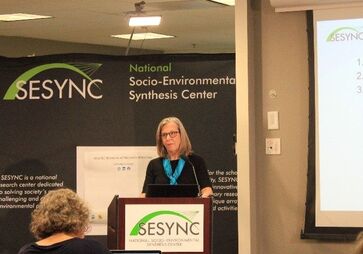|
Written by: Mike Nan, PhD student, St. Leger lab
Dr. Jian Duan, a Research Entomologist at USDA, is working on sustainable ways to manage the invasive emerald ash borer (EAB) through introduction and establishment of natural enemies (stingless wasps) from the pest’s native range. This approach, also termed as classical biological control in the literature, can lead to permanent or sustainable reductions of pest populations. Dr. Duan explained that there are four stages in the invasion of new environment by a non-native species: (1) Transport (Introduction), (2) Establishment (or colonization), (3) Spread, and (4) Impact. There are two possible outcomes at each stage that can lead to either failure or success in progression.  Dr. Margaret Palmer giving a presentation about SESYNC. Dr. Margaret Palmer giving a presentation about SESYNC. written by: Max Ferlauto, MS student, Burghardt Lab In this anthropogenic age, most natural, social, and economic systems are tightly linked. However, scholars studying these systems tend to be isolated by their respective disciplines. It is the role of the National Socio-Environmental Synthesis Center (SESYNC) to bridge this divide. SESYNC, located in Annapolis, MD, is one of four Synthesis Centers that have been funded by the National Science Foundation (NSF). Synthesis Centers facilitate team research to generate discoveries from existing data, addressing fundamental questions and leading to innovative solutions. What sets SESYNC apart from other Synthesis Centers is its focus on linking natural and social science together. The idea came about in 2010 at a small workshop during a discussion about the NSF’s call for a new Synthesis Center. Margaret Palmer, Bill Fagan – both professors at the University of Maryland, and Jonathan Kramer, the then director of the Maryland Sea Grant, decided that the new center needed to study socio-environmental not just ecological science. Palmer and Kramer, joined by ecological economist Jim Boyd, spent almost a year drafting the proposal. Their effort paid off and the NSF provided funding for SESYNC in 2011. |
Categories
All
Archives
June 2024
|
Department of Entomology
University of Maryland
4112 Plant Sciences Building
College Park, MD 20742-4454
USA
Telephone: 301.405.3911
Fax: 301.314.9290
University of Maryland
4112 Plant Sciences Building
College Park, MD 20742-4454
USA
Telephone: 301.405.3911
Fax: 301.314.9290

 RSS Feed
RSS Feed




